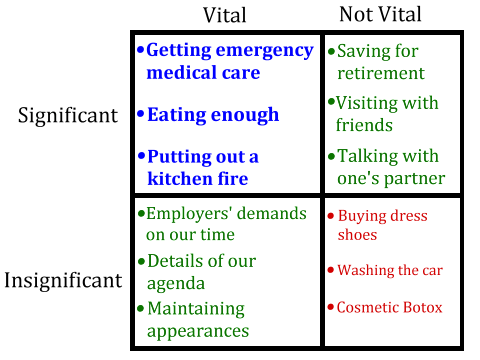
It sounds crazy, but after a few years in retirement I found it harder than ever to get necessary things done, as a result feeling harried and wondering how to escape a darned need-doing-list that just keeps getting longer. I asked others who seemed more relaxed how they managed it and have aimed to put their wisdom to work for me. Oddly enough, many of these folks have more demands on their time, yet accomplish extra. By comparison, they take things as they come, deal right away with what comes up, respond to several others' requests for their input, communication, or shared engagement, and have the leisure time budget equivalent of an empty in-box.
Warren Buffett, for example, carefully protects his spare time so that, despite being probably the world's most successful and famous value investor plus head of his company, Berkshire Hathaway, he usually has several hours a day free for doing nothing but letting his creative juices flow. Not all these folks are smarter than me, yet they all have something I do not, comparative freedom from stress when it comes to time management.
With the insight that just one or two applicable ideas might enhance one's quality of life by 10% or more and several could transform it, here are the best notions people have offered for how they do it:
1. Remove the clutter. Do I really need to put shaving, brushing my teeth, or taking the dog for a walk on my to-do list? Things I'm going to do most any day or manage while hardly thinking about it can simply be dropped from a necessary agenda. Similarly with things that I have not done for months but for which there are essentially no consequences if they remain unfinished indefinitely. On my list a number of times over the past year, for instance, was this item: "Buy dress shoes." Well, when that is truly called for I can shop at Payless or Designer Shoe Warehouse. Till then, it is just taking up extra mental energy and space on my tablet. Part of decluttering involves being well organized. A portion of that, in turn, means my physical environment. If my "stuff" is helter-skelter, it is probably going to occupy me mentally that way too.
2. Focus on the 1, 2, or 3 non-routine things I really intend to finish today. It is better if these are important tasks about which I would feel great for having gotten them behind me. For this, it may help to use a triage approach to prioritizing. The realtor who sold Valerie and me our house of the last 33 years limited his to-do list to one item daily. When we closed on the property, that (along with getting his commission, of course) was his one thing for that day, and then he allowed himself to goof off or celebrate for the rest of the day. Tomorrow, he would have a new top thing, but for the rest of today, no worries. A compulsion to do more and yet more may feel productive, however it can be symptomatic of a workaholic. Too often, regularly doing more and then still more involves at once making errors and running our lives less well. 
3. How much screen time is enough? The average adult in our country now spends around 8-9 hours on a typical day glued to a TV, computer, laptop, game machine, tablet, smart phone, etc. Kids, depending on their ages, usually spend about 2-5 hours a day in such activities. What is healthy and best for budgeting our schedules? While study conclusions vary, it appears that in the modern world we may "need" up to an hour of daily time in front of one or another screen, yet much more than this is correlated with lower contentment and feeling that our lives have become less rewarding. Exercise and one-on-one engagement with people or even pets, by contrast, seem linked to greater satisfaction and happiness. So, if we are used to several couch potato hours daily, a like amount of time sitting in front of the computer, looking at our smart phones, and so forth, one way to instantly get an extra hour or more a day is to turn these devices on less often and stay in front of them fewer minutes when we do. Moderation here is good. We might try letting them be incentives for jobs well done that we had been putting off.
4. Respect for our own boundaries is a valuable tool. "No," as is said, is a complete sentence. It can be delivered in a kind way, yet we need not feel we must be available to do things for or with another person whenever they wish. We will likely be more ready to devote quality time to a sensitive e-mail, visit, or call, much less doing chores for another, when caught up with our priorities and having looked after our own needs, including free time, real rest, and desired recreational activities.
5. Procrastination can have its place. It might leave one's mind free to percolate and perhaps arrive at previously unimagined solutions, yet putting things off can of course be overdone too. If we put something among our priority task reminders more than five times, chances are it is a distraction and reduces a capacity for calm, so postponing further is hardly worthwhile. Better to at least begin a challenging undertaking than let it keep stealing the focus from more immediate concerns in the moment. Once it is out of the way, we can for good measure give ourselves well deserved rewards. A piece of M&M candy or a healthier grape can do it for lab animals. What works for us?